Moving on from a near-exclusive focus on new releases has been great for my reading but I still love making exciting discoveries in the constant flow of new titles. My first selection of 2019 consists of six novels set between the 18th century and the present day via several decades of the twentieth, plus a memoir, a short story collection and a book of essays. Usually some unintended common thread emerges between the books I choose but this time I’m more struck by the range of themes and settings (in the broadest sense, including social and cultural). These nine books demonstrate the appeal of subjects both within and beyond the mainstream – a concept which needs to be challenged in any case – and authors’ ability to give readers a new take on a familiar context or engage us in one we don’t know. Hopefully this means there’s a good chance something here will appeal to you.
If you like the listing, sharing it on your social networks helps to support these talented writers and to keep this blog in business. (I’m talking about time and effort, not money, but I’m sure you knew that.) THANK YOU for your support!
Some of the authors will be visiting the blog in the coming weeks – see Sofa Dates below for details of some fantastic guest posts to look forward to.
Text adapted from publicity materials. In order of first UK release starting with those already available.
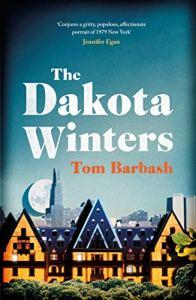
It’s the fall of 1979 when 23-year-old Anton Winter, back from the Peace Corps and on the mend from a nasty bout of malaria, returns to his childhood home in the Dakota in New York City. Anton’s father, the famous late-night host Buddy Winter is there to greet him, himself recovering from a breakdown. Before long Anton is swept up in an effort to reignite Buddy’s stalled career, a mission that takes him from the gritty streets of New York, to the slopes of the Lake Placid Olympics, to the Hollywood Hills, to the blue waters of the Bermuda Triangle, and brings him into close quarters with the likes of Johnny Carson, Ted and Joan Kennedy, and a seagoing John Lennon. But the more Anton finds himself enmeshed in his father’s professional and spiritual reinvention, the more he questions his own path, and fissures in the Winter family begin to threaten their close bond.
Why I chose it: This novel surpassed my expectations as a fan of Barbash’s short fiction. He captures the era (I especially loved the New York/Dakota parts) and the nuances of a complex father-son relationship with emotional power, a keen eye and taut prose.
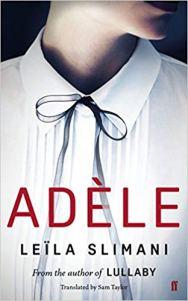
Adèle appears to have the perfect life. A respected journalist, she lives in a flawless Parisian apartment with her surgeon husband and their young son. But beneath the veneer of ‘having it all’, she is bored – and consumed by an insatiable need for sex, whatever the cost. Struggling to contain the twin forces of compulsion and desire, she begins to orchestrate her life around her one night stands and extramarital affairs, arriving late to work and lying to her husband about where she’s been, until she becomes ensnared in a trap of her own making.
Why I chose it: Click though to my Summer 2018 reading round-up to find out why I was impressed by this detached and disturbing portrait of a female sex addict when I read it in French. Is it erotic? Nobody can answer that for you.
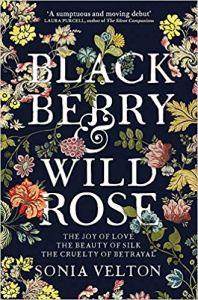
When Ester Thorel, the wife of a Huguenot silk-weaver, rescues Sara Kemp from a brothel she thinks she is doing God’s will. In the Thorels’ tall house in Spitalfields, where the strange cadence of the looms fills the attic, the two women forge an uneasy relationship. Sara despises her mistress’s blindness to the hypocrisy of her household, while Esther is too wrapped up in her own secrets to see Sara as anything more than another charitable cause. For years Esther has painted her own designs, dreaming that one day her husband will weave them into reality. When he laughs at her ambition, she unwittingly sets in motion events that will change the fate of the whole Thorel household and set the scene for a devastating day of reckoning between her and Sara.
Why I chose it: Reading this in the depths of winter, I was so transported by the rich and image-led writing that it was as if I’d watched the film. With unique voices and characters to invest in, there’s a clever balance of beauty and ugliness with flashes of dark humor. A standout among the historical novels I’ve read.
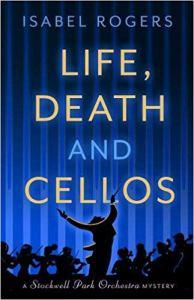
What with love affairs, their conductor dropping dead, a stolen cello and no money, Stockwell Park Orchestra is having a fraught season. After Mrs Ford-Hughes is squashed and injured by a dying guest conductor mid-concert, she and her husband withdraw their generous financial backing, leaving the orchestra broke and unsure of its future. Cellist Erin suggests a recovery plan, but since it involves their unreliable leader, Fenella, playing a priceless Stradivari cello which then goes missing, it’s not a foolproof one. Joshua, the regular conductor, can’t decide which affair to commit to, while manager David’s nervous tic returns at every doom-laden report from the orchestra’s treasurer. There is one way to survive, but is letting a tone-deaf diva sing Strauss too high a price to pay? And will Stockwell Park Orchestra live to play another season?
Why I chose it: Who doesn’t need some light relief at the moment? With its retro humor bordering on farce, this novel offers an escape into the turbulent (and bonkers) world of the orchestra. My take-home was that it prompted me to get back into listening to classical music.
SOFA DATE: 13 February – Isabel Rogers on Writing about Music
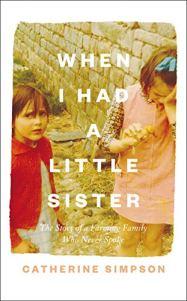
On a cold December day in 2013 Catherine Simpson received the phone call she had feared for years. Her little sister Tricia had been found dead in the Lancashire farmhouse where she, Catherine and their sister Elizabeth were born – and where their family had lived for generations. Tricia was 46 and had been stalked by depression all her life. Yet mental illness was a taboo subject within the family and although love was never lacking, there was a silence at its heart. After Tricia died, Catherine found she had kept a lifetime of diaries. The words in them took her back to a past they had shared, but experienced so differently, and offered a thread to help explore the labyrinth of her sister’s suicide.
Why I chose it: Whilst this is obviously a tragic story and some parts are painful to read, it is far from a depressing book. It’s the story of an ‘ordinary’ family with complicated dynamics that make it universal as well as insightful. Beautifully written, this really resonated with me – I’ll say more in my review accompanying the first guest post.
SOFA DATE: 6 February – Catherine Simpson on Writing about Mental Health
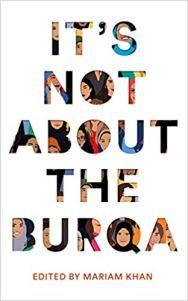
In 2016, Mariam Khan read that David Cameron had linked the radicalisation of Muslim men to the ‘traditional submissiveness’ of Muslim women. Why was she hearing about Muslim women from people who were neither Muslim nor female? Since then the discourse has deteriorated further, and Muslim women’s voices are still pushed to the fringes – the figures leading the discussion white and male. Taking one of the most politicised and misused words associated with Muslim women and Islamophobia, It’s Not About the Burqa features 18 Muslim women speaking frankly about the hijab and wavering faith, about love and divorce, about feminism, queer identity, sex and the twin threats of a disapproving community and a racist country. Funny, warm, sometimes sad and often angry, each of these essays is a passionate declaration, calling time on oppression, lazy stereotyping, misogyny and Islamophobia.
Why I chose it: My reasons – an interest in the multicultural make-up of France and the fact my son is currently living in a Muslim country – are a bit left-field, but these impassioned and lively perspectives will interest anyone who wants to further their understanding of others’ lives – as individuals, not just members of a community.
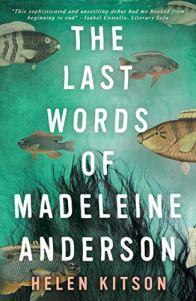
Once upon a time Gabrielle Price wrote and published an extraordinary novel. But twenty years on her literary star has dimmed, her “work of genius” is all but forgotten, and no further novels have materialized. She now lives a lonely and unremarkable life dominated by memories of her best friend Madeleine, who died young in tragic and unexplained circumstances. Gabrielle’s quiet world is turned upside down when she meets and befriends Simon – young, attractive, a would-be writer, and enthusiastic fan of the astonishing novel that Gabrielle published all those years ago. Charmed and flattered, she recklessly invites him into her home and her heart. But Simon is mysterious and manipulative, and it’s not long before he forces Gabrielle to confront the demons in her past. Gabrielle’s obsession begins to destroy her carefully cultivated life, and she comes to feel increasingly threatened by Simon’s presence. Who is he? Why did he seek her out? And what does he really want?
Why I chose it: As you can see from my front cover endorsement, ‘this sophisticated and unsettling debut had me hooked from beginning to end’. It doesn’t take itself too seriously despite airing some complex ideas, including the mysteries of storytelling.
SOFA DATE: 13 March – Helen Kitson on Writing about Writer
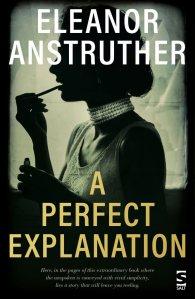
Exploring themes of ownership and abandonment, A Perfect Explanation is a fictionalised account of the true story of Enid Campbell (1892-1964), granddaughter of the 8th Duke of Argyll (and grandmother of the author), who sold her son to her sister for £500. Interweaving one significant day in 1964 with a decade during the interwar period, the novel gets to the heart of what it means to be bound by gender, heritage and tradition, to fight, to lose, to fight again. In a world of privilege, truth remains the same; there are no heroes or villains, only people misunderstood.
Why I chose it: I was bowled over by the quality of writing and storytelling in this debut and became very invested in its dark and often shocking events, all the more so for having taken place in real life. This is not human nature at its finest (but then, what novel is?) and a story to test the reader’s empathy, all of which would make it a great book to discuss.
SOFA DATE: 20 March – Eleanor Anstruther on Fictionalising a Family Story
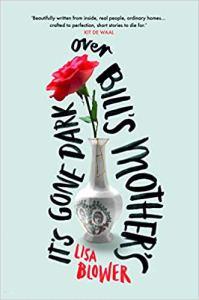
Lisa Blower celebrates her characters with stories that they wouldn’t want told. She makes the bleak funny, in a voice reminiscent of Alan Bennett, and strikes a new chord in regional and working-class fiction. With a sharp eye and tough warmth, Lisa Blower brings to life the silent histories and harsh realities of those living on the margins. The matriarch dominates these award-winning stories in Lisa Blower’s debut collection. From the wise, witty and outspoken Nan of Broken Crockery, who has lived and worked in Stoke-on-Trent for all of her 92 years, never owning a passport, to happy hooker Ruthie in The Land of Make Believe or young mom Roxanne in The Cherry Tree, she appears in many shapes and forms, and always with a stoicism that is hard to break down. The title is a Potteries saying that means it’s looking a bit bleak, a little like rain.
Why I chose it: This is top notch short fiction, showing remarkable depth of voice, character and human bonds. The first story, Barmouth, is magnificent and made more of an impact on me than many novels.
Advertisements
